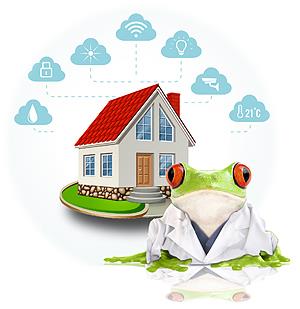July 2014: Smart home technology is super convenient! It can learn your patterns and you can control it with apps or a single touch screen — no more bothering with pesky things like turning lights off (or on), going to the door to see who’s there or paying to cool your home when no one’s there.
While frogs love technology even more than slow-flying insects, we don’t love jumping in blindly. Here are six things to consider before attempting to educate your house:
The variety of home automation choices you have right now is huge. You can choose boxed packages from Lowes or Home Depot … choose systems from Honeywell, Verizon, ZigBee, Samsung or ADT … buy individual items and hook them up yourself … use Google’s Nest, Savant’s Apple-based system or, soon, Apple’s system.
This is all part of the Internet of Everything. And it includes appliances and gadgets like thermostats, lights, smoke detectors, coffee pots, entertainment systems, security cameras, locks and more.
But, you ask, if everything is connected through the Internet (or WiFi or Bluetooth), doesn’t this mean my home is now vulnerable to hackers just like my computer?
Indeed it is! Smart hackers may be able to:
1. Access control of your system
2. Take over your video surveillance
3. Schedule a break-in at a time they know you’re not there and won’t be for hours
4. Turn off your alarm
5. Unlock your door
Leaping letdown!
And then there’s the usual malware and everyday-type tech problems, like those described in wired.com’s hilarious The Nightmare on Connected Home Street.
The good news is it’s not easy for run-of-the-mill hackers to figure out this stuff for themselves. The bad news is they can take a week-long class to learn it all for $1,999. (Yes, the class is legal. What’s not legal is actually stealing something.)
For burglars on a budget, there are black hat dispatchers who will sell you a house code for about $500.
What can you do to thwart the would-be thieves? Choose your smart system wisely! Go for one with multi-factor authentication (but they can be tough to find), a closed network (also rare), and don’t integrate your entire house into one master app. Because while that’s convenient for you, it’s also convenient for hackers — they won’t even need to take a class!
One final caveat as you smarten up your home:
6. Your data trail may backfire on you — we’re not lawyer frogs but it looks like your data could be subject to warrants and subpoenas.
| You may also be interested in: |

